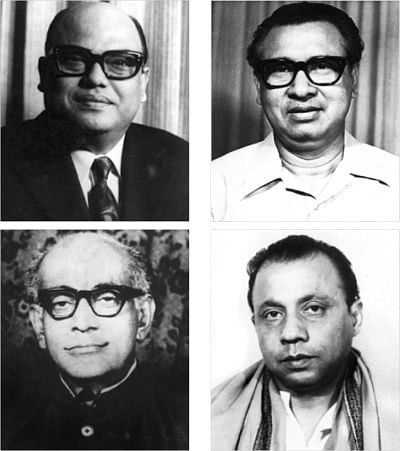Jail Killing Day

The history of Bangladesh has great moments of happiness and sorrow. At times Bangladesh reached great heights of happiness. At times she went down into bottomless pits of sorrow. December 16, 1971 and December 6, 1990 are great days of happiness. On the other hand, February 21, 1952 and March 25, 1971 are very sad dates. Similarly August 15, 1975 and November 3, 1975 are very tragic dates which should have never come to us with such grief. The killing of our greatest patriots still leaves us dumbfound in deep sorrow.
Jail Killing Day is very tragic and very shameful at the same time. How could a few misguided and power-hungry people so brutally kill four architects of our independence, four great personalities who worked so sincerely to give birth to the modern Bangla nation? Foreign instigation should not have made them stoop so low. Or, for that matter, how could they kill the main leader of our independence, an elected president commanding great respect the world over? And his family, including his ten-year-old youngest child? We only wish such things had never happened and tarnished our image.
The jail is supposed to be a safe place. It is the jail authority's or the government's duty to ensure the safety of prisoners. But the then government of Khandaker Mushtaq Ahmed failed to protect the lives of four of our greatest sons. He really behaved like a Mir Zafar. How could he kill four patriots with whom he spent almost all of his political life? We are sure a sense of guilt, or at least his subconscious, chased him till his last day.
Our four national leaders were around fifty years of age when they were killed. Only Mansur Ali was fifty seven. They had still so much to give to the nation. For them politics really meant serving our suffering millions and not a way to gain personally or amass wealth.
Syed Nazrul Islam retired prematurely from the Pakistan Civil Service for the sake of politics. He wanted to be a friend of the people, not their master. He became a college teacher and later an advocate. His honesty, merit and sincerity made him one of Bangabandhu's most trusted deputies. He left neither a house in Dhaka nor a car for his wife and six children. He used to console his complaining yet sober wife that her meritorious children, by the grace of the Almighty, would take care of her in his absence. He was an idealist and politics to him was serving the people and nothing else. His glorious role in 1971 would give him a permanent place in the history of Bangladesh.
Nowadays, a few years in power means costly cars and bungalows even for a mediocre politician. Bangladesh never again saw the likes of Syed Nazrul Islam or his brilliant friend, Tajuddin Ahmed, an idealist to the core of his heart, who served the nation so well as the first prime minister during its greatest crisis. Tajuddin's patriotism, honesty and dedication to his job were matchless. As a prime minister, he lived a very simple life.
Mansur Ali was a graduate of the Aligarh University and a man of high moral values. His loyalty to his country and his leader was beyond doubt. He gave his life but, like the other three, re-fused to join the cabinet of Khandaker Mushtaq. Kamruzzaman was a poet and a patron of classical music. He edited a newspaper. He was a famed athlete during his student days. He also vehemently resisted all proposals of the cunning Khandaker and remained loyal to his country and its people.
What rewards did these four patriots get for their dedicated service to the nation? A few ungrateful Bangladeshis got rid of them brutally. We are not going to forgive these killers. We want them punished by the court of law. There should be no further delay of the trial. The BNP government of 2001-2006 publicly stated that it wanted a proper trial of the murder of these national leaders but delayed the trial.
Our media, both print and electronic, nowadays show respect to the four national heroes by remembering them with proper honour. This they are doing after becoming powerful during the last decade or so. Earlier, even they couldn't tell the truth to the nation. A generation has grown up knowing so little about Syed Nazrul Islam or Tajuddin Ahmed. Our youngsters know about the villains of our history than about the true heroes.
Now is the time to rectify ourselves. Our school textbooks should carry a description of their lives and work. Our youngsters don't know that Syed Nazrul Islam was a meritorious student and a Bhasha Shainik, an elected VP of the SM Hall Students' Union and a Dhaka University blue in hockey and cricket. They don't know that Tajuddin Ahmed was the best student of his class at St. Gregory's High School and the University of Dhaka.
No more negligence of four of our best patriots. And no repetition of the Jail Killing Day ever in our history!

 For all latest news, follow The Daily Star's Google News channel.
For all latest news, follow The Daily Star's Google News channel. 



Comments